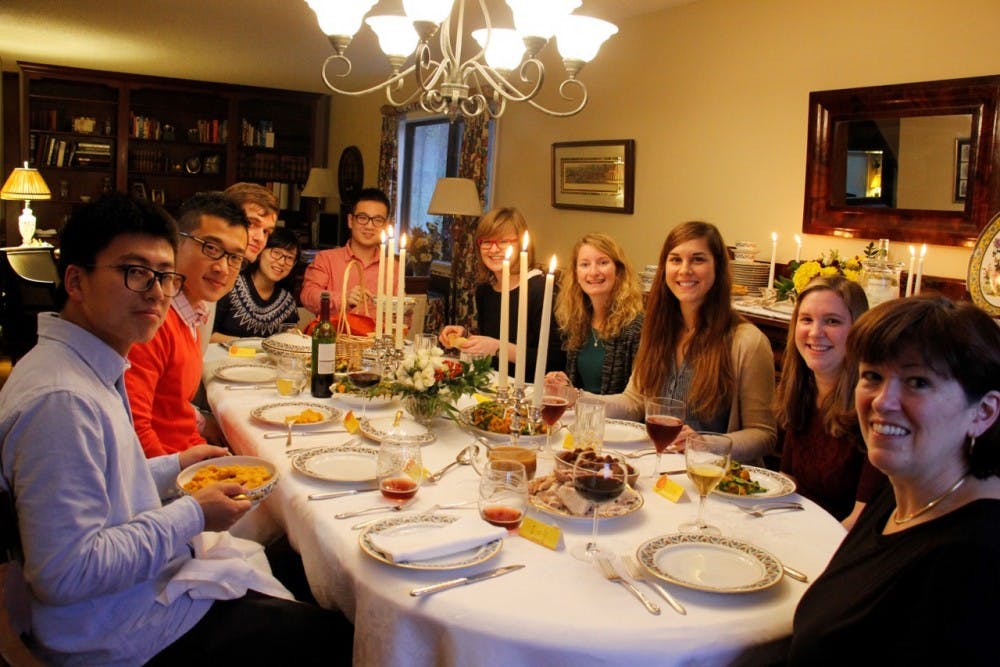For many people, Thanksgiving is a time for family and food. The day is spent carrying on traditions that make this holiday so special, whether they are cooking family recipes, playing football or participating in a Turkey Trot. For some international students, however, this is not the case. This holiday is new and unfamiliar, waiting to be filled with traditions of its own.
“Initially I didn’t really know what Thanksgiving was all about,” said third-year Commerce student Sasha Clements, who is from Malta. “It seemed strange to me that there was so much excitement for this holiday I had essentially never heard of.”
Chenghan Zhou, a second-year College student from China, shared similar sentiments.
“My first impression of Thanksgiving was a big meal with a family,” said Zhou in an email to The Cavalier Daily. “This impression did not change much as I remember that [Charlottesville] seemed empty … we could not even find a restaurant open on that day.”
Zhou is one of 107 students that have registered for the Thanksgiving Meal Match program through the Lorna Sundberg International Center. This program matches University students with local Charlottesville families, many of whom are University faculty, allowing them to participate in an American Thanksgiving experience.
“I hope that instead of reading the traditions [in a] book or the internet, I can experience the time preparing the meal or chatting with a local family,” Zhou said. “It’s always helpful to experience American culture that differs from University life and have a chance to feel connected [to] the community.”
Community connection echoes the hopes Quynh Nguyen has for this program. Nguyen is the International Student and Scholar Services coordinator at the Lorna Sundberg International Center and is responsible for matching students with host families. Nguyen sees the benefits of the Meal Match program from the perspective of both the students and the hosts.
“I think it’s really nice for international students to have an [opportunity] to observe the holiday and take part in it in a very traditional way,” Nguyen said. “For the host, too, it’s a great way for them to have these one-on-one [conversations] with international students [and] hear about their experience in the US and what holiday traditions are like in their own country and within their own families.”
McIntire Prof. Dorothy Kelly has been a host for the Meal Match program since 2015 and signed up again this year.
“I studied abroad during my junior year in college and remember missing my family at Thanksgiving... “ Kelly said in an email. “Hosting Thanksgiving dinner is my way to honor the kindness and generosity of the strangers who invited me to break bread more than 30 years ago and pass it on to the next generation.”
Kelly, who hosts an average of 12 students a year, invites students to help her prepare a Thanksgiving feast around noon. A favorite memory Kelly has was when a student performed an impromptu recital on her neglected piano.
“It was a delight to hear the music fill the room,” Kelly said. “It would be marvelous if one of this year’s guests could do the same.”
Nguyen noted that big Thanksgiving dinners put on by churches and large groups are also available to students but believes the experience is just not the same.
“But to go into someone’s home [and] to celebrate with their family and get to see what [different] families do … being in that environment and that company is a very unique and special cultural exchange for students,” Nguyen said.
Economics Prof. Kenneth Elzinga does not participate in this program, but he has opened his home to students on Thanksgiving for the past 48 years. Elzinga and his wife found it too exhausting to get home to Michigan and back in time for class, so they decided to create a new family tradition. Elzinga admits the idea was his wife’s.
Every year, Elzinga extends this offer to students in his ECON 2010 class who are not able make it home. The only way for a student to return the following year would be if they had failed the class and were retaking it, he joked.
“It seems kind of stunning to the students when you make an announcement to almost 1,000 people that they could come to our house for Thanksgiving,” Elzinga said. “You think how could that be.”
Elzinga gives credit to the University student body as a whole for making this manageable.
“One of the most neat things about U.Va. is that most students at U.Va. who are international students are invited to the home of another student,” Elzinga said. “So what would seem like a scary announcement to make really isn’t that scary, because of the friendliness of the University community among the student body is such that most people get invited home anyway.”
Elzinga and his wife open their home for the celebration to those who aren’t invited to go elsewhere. This is usually about 20 students per year and has taken place in their three different homes over the years — one of those being Pavilion IV on the Lawn. He said he believes that Thanksgiving is easy to celebrate regardless of nationality because of its simplicity.
“It isn’t part of a religious holiday in the sense of the word,” Elzinga said. “There’s no presents involved, you basically get together and have a great family dinner.”
Elzinga typically gives his guests a brief history lesson and reads Psalm 100, which was believed to have been read by the Pilgrims at the very first Thanksgiving.
“That’s really the only religious element in Thanksgiving in our home, but it does remind people that we are grateful,” Elzinga said. “I think the thing about Thanksgiving is everybody can understand the concept of being thankful.”
Elzinga leaves the cooking to his wife, who prepares regular Thanksgiving favorites, including turkey, sweet potato casserole, green beans and of course, pumpkin pie.
Nguyen from the Meal Match program mentions well-known Thanksgiving food as being talked about the most in student feedback.
“For some of them they have never had turkey or cranberry sauces, so we always get positive feedback about the food itself,” Nguyen said.
Zhou described these traditional foods as a “novelty.” She said she is looking forward to having roast turkey and pumpkin pie. Zhou said that cinnamon is a spice used to cook meat in Chinese cuisine, and she fell in love with cinnamon-seasoned sweets, such as pumpkin- or apple-based desserts.
“Some combinations of food may be normal in America, but they are a novelty to me,” Zhou said. “I had turkey with cranberry sauce last year and it was an amazing combination.”
After celebrating Thanksgiving for the past two years, Clements said that his perception of the holiday changed.
“I now get why everybody loves it,” Clements said. “It’s a really special holiday because it brings people together without the usual holiday stress of giving and receiving gifts.”
Whether it is an international student’s first time celebrating Thanksgiving or not, the University and the greater Charlottesville community offer opportunities to make this holiday one students can celebrate away from home.
This year, Elzinga will not be hosting students in his home for Thanksgiving due to family reasons, but he and his wife will be hosting a table at the International Thanksgiving Dinner at Trinity Presbyterian Church on Nov. 18 instead.
“Any international person who is connected with the University who doesn’t have a family to be with at Thanksgiving is welcome to come to our church for dinner,” Elzinga said. “And we really put on a dinner.”







